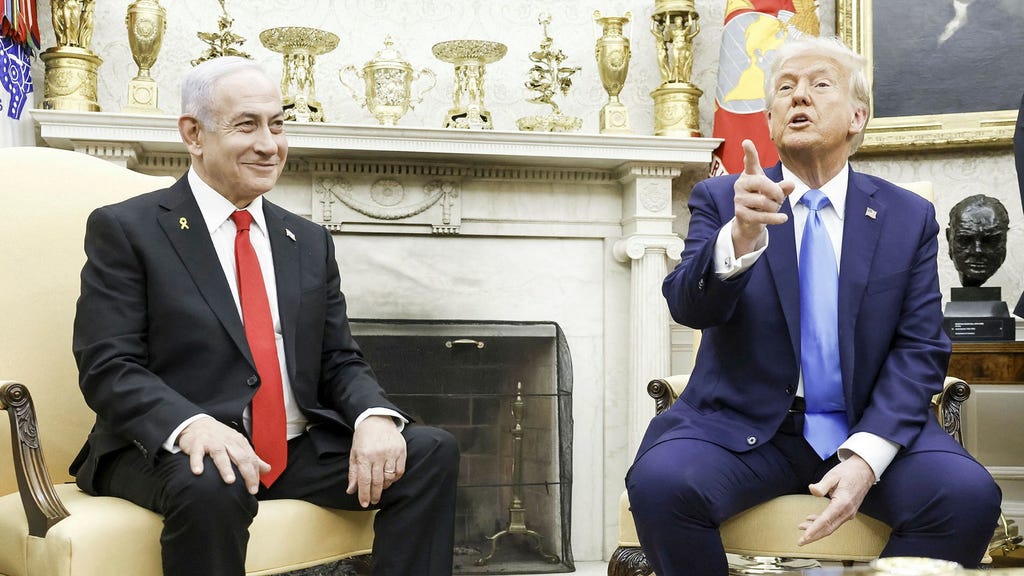The meeting between US President Donald Trump and Israeli Prime Minister Benjamin Netanyahu on Tuesday evening, amidst the escalating Gaza conflict, was marked by a conspicuous display of camaraderie. Smiling broadly for the press, both leaders emphasized the strength of the US-Israel relationship, with Netanyahu highlighting the increased chances of success when the two nations, and specifically their leaders, work in tandem. This public display of unity served as a backdrop to the crucial discussions about the ongoing crisis, signaling a unified front against the escalating violence. While the specific details of their conversation remain undisclosed, the optics of the meeting suggest a strong alignment in their approach to the conflict.
The timing of the meeting itself is significant. Occurring during a period of intense international scrutiny and pressure to de-escalate the conflict, the Trump-Netanyahu meeting underscored the US’s unwavering support for Israel. This support, traditionally a cornerstone of US foreign policy, has come under increasing criticism in recent years, particularly given the escalating humanitarian crisis in Gaza. However, the meeting served as a clear reaffirmation of this alliance, potentially signaling a reluctance on the part of the US to exert significant pressure on Israel to alter its course of action. It also presented an opportunity for Netanyahu to garner further international legitimacy for Israel’s actions in Gaza.
The emphasis on personal rapport between Trump and Netanyahu, evident in their public interactions, highlights the importance of personal diplomacy in international relations. This personal connection appears to have fostered a strong sense of trust and mutual understanding, influencing the dynamics of the US-Israel relationship. While the long-term implications of this personal diplomacy are yet to be fully understood, it clearly played a role in shaping the US response to the Gaza crisis during the Trump presidency. This personalized approach to diplomacy, while potentially effective in building strong alliances, can also raise concerns about its susceptibility to individual biases and preferences.
The backdrop of the Gaza conflict, with its complex history and multitude of actors, adds another layer of complexity to this meeting. The conflict, characterized by cycles of violence and deep-seated grievances on both sides, presents a significant challenge to international peace and security. The meeting between Trump and Netanyahu comes at a critical juncture, with the potential to either exacerbate or mitigate the ongoing violence. The international community watches closely, hoping for a resolution that addresses the root causes of the conflict and brings an end to the suffering of civilians. The meeting’s outcome, therefore, carries significant weight for the future trajectory of the conflict and the prospects for peace in the region.
Beyond the immediate context of the Gaza conflict, the meeting also reflects broader geopolitical dynamics. The US-Israel relationship plays a crucial role in the Middle East, impacting regional stability and power dynamics. The meeting provided an opportunity for both leaders to discuss wider regional issues, including Iran’s nuclear program and the ongoing conflicts in Syria and Yemen. The reaffirmation of the US-Israel alliance, particularly during a period of heightened tensions in the region, sends a strong message to other actors in the Middle East and beyond. It also underscores the importance of the US-Israel relationship in shaping the geopolitical landscape of the region.
In conclusion, the meeting between President Trump and Prime Minister Netanyahu, held against the backdrop of the escalating Gaza conflict, carried significant weight, both symbolically and substantively. It reaffirmed the strong bond between the US and Israel, signaled continued US support for Israel’s actions, and provided a platform for discussing both the immediate crisis and broader regional challenges. The meeting also highlighted the influence of personal diplomacy in international relations and the potential implications of close personal ties between leaders. While the long-term consequences of the meeting are yet to be fully realized, it undoubtedly played a significant role in shaping the US response to the Gaza crisis and the trajectory of the US-Israel relationship. The international community will continue to observe the unfolding situation in Gaza and the broader implications of this meeting for regional peace and security.














